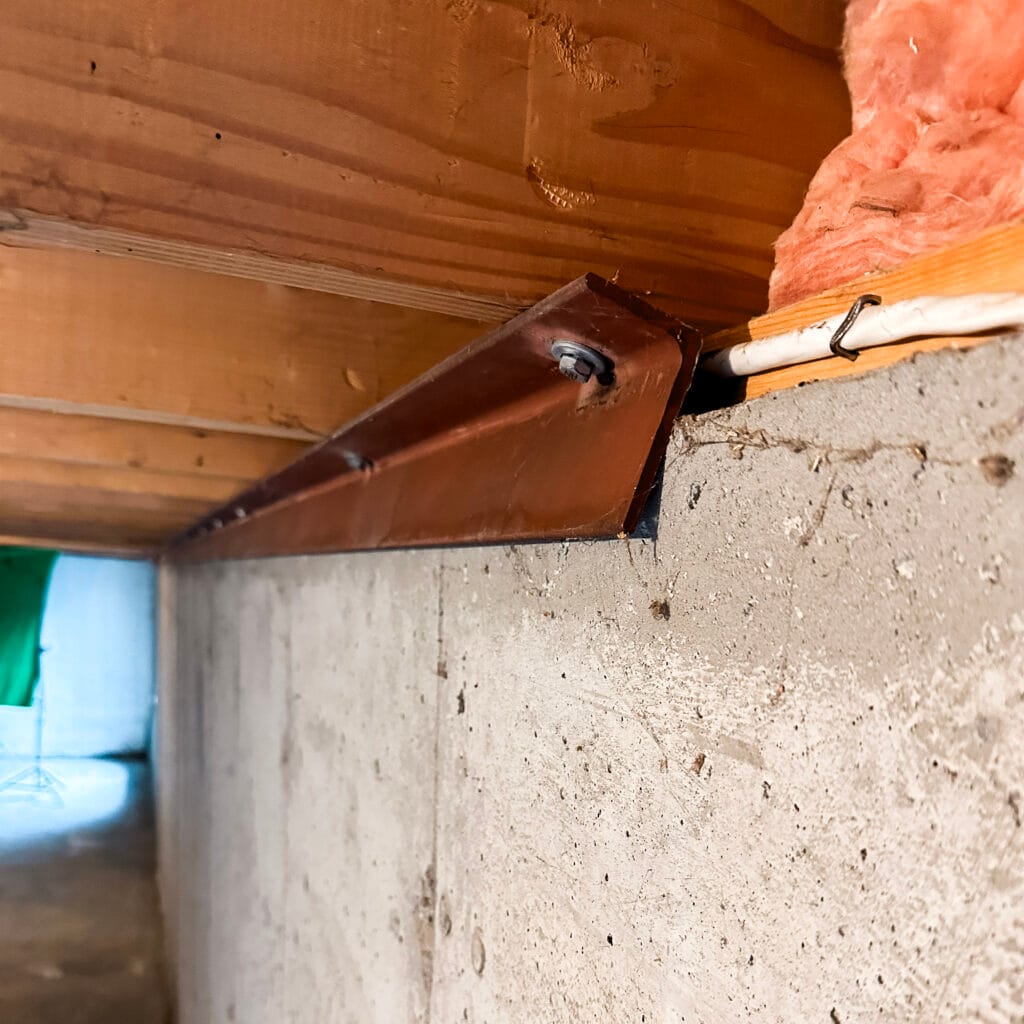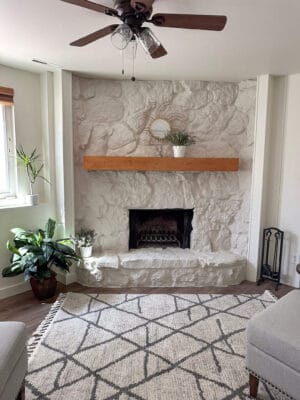Nothing compares to that gut-punch feeling of discovering a major, expensive repair in your new home. This week we got some answers about who is liable for the cost of our cracked, leaning foundation wall repair.
(In case you missed it, we discovered a cracked, leaning foundation wall in our basement a few weeks after we moved in to our new house this summer. It’s a complicated, unfortunate situation I know many other homeowners have encountered.)
Is Your Home Inspector Liable For Missing A Leaning Foundation Wall?
Foundation issues are something your home inspector is obligated to report to you in the home-buying process.
But what do you do when they miss something major in their report, leaving you in the lurch after you’ve already closed on your home?
This is the situation we found ourselves in two weeks after moving into our 90’s home in Northern Colorado.
While unpacking, I discovered thick vertical wall cracks and a significant lean in our North foundation wall.
After a call to two local foundation companies, it was confirmed the foundation wall is leaning in 3.25 inches and is in stage 2 wall failure. The next stage being collapse.
Talk about panic.
We knew we were buying a fixer upper, but we trusted our home inspector’s word that the “bones” (all the structural needs) were in the clear. Turns out, we should have gotten a second opinion.

Can we sue our home inspector for a home defect they missed?
It seems likely our home inspector missed this foundation issue when he inspected our house in May. It’s nearly impossible that our basement wall could have moved 2-3″ in 30 days in between his inspection and when we moved in.
We’ve been informed that home inspectors have contract clauses or even insurance to help cover issues they missed.
Looking back at his hiring contract, we were obligated to report any potential issues he missed within 30 days of the inspection in order for him to be liable.
Which is unfortunate because we hadn’t even moved in to the house yet by then.
Not willing to give up, I called him to see if he’d offer any solutions to help us. We set up a time for him to come back to the house and reinspect it.

After a lengthy conversation, our home inspector refunded our inspection fee. He didn’t admit any fault or take responsibility. But he recommended we call the foundation company who worked on a separate part of our foundation back in 2012, pointing the blame mostly at them.
He said that he thought this leaning foundation wall was much straighter when he inspected the home in May.
But he wasn’t able to show me any pictures to demonstrate this.
Liability of a Leaning Foundation Wall
Nathan and I spent a long time talking through this situation.
We feel our home inspector did not adequately inform us about the red flags that indicated a foundation issue: the obvious vertical wall cracks, the steel beam along the top of the foundation wall, and the wall lean.

The soil here in Northern Colorado is expansive. So moving/sinking foundations or concrete steps, porches, and driveways, is very common here.
But after talking with two local structural repair companies, it’s highly unlikely a foundation wall can move 2-3″ inches within 30 days.
However, proving the wall was leaning during his inspection is difficult if not impossible. So pursing any kind of legal action could be costly and difficult.
Home Buying Tip
If we ever move and need to hire another home inspector, I’ll be asking if they’re insured and how they’d handle a situation like this!
Since our contract releases our home inspector of liability, and he didn’t offer any further financial assistance to help with this unexpected structural foundation repair, we’re dropping this situation and moving forward on our own.
Is a foundation repair covered under warranty or insurance?
With our home inspector out of the equation, I reached out to the original foundation repair company that fixed the West-facing basement wall back in 2012 when the original home owner lived here.
(The dark gray stripe on the back wall in the picture below is one of the counter-foots this company installed in 2012. The leaning foundation wall we’re having issues with now is to the right. For some reason they installed a steel beam at the top of this wall.)
I wanted to see if they could explain the repair work that was done. And find if there was any way they were liable to fix our leaning foundation wall now through a warranty.

Reaching them proved complicated. Of course.
The original structural engineering company was bought out by a bigger company a few years ago, and the repair work itself was contracted out. It’s a bit of a mess. I was able to talk with someone at the new company who found the original repair file. I was told they’d review my case and get back to me.
A few weeks later, I still haven’t been able to get in touch with them again. We have doubts about pursuing this avenue.
If they made a mistake fixing our foundation in 2012, I’m not sure I want them to come back and do it wrong again.
So we’re choosing to drop this path too.
Foundation issues are not typically covered under normal home insurance or a home warranty. Another reason why it’s important to get a good inspection done prior to closing on your home!
Foundation Wall Repair: Next Steps
Unfortunately, it looks like we’ll be paying for this unexpected foundation wall repair out of our own pocket.
We’re not interested in taking legal action against anyone. We’d rather save our money for the repair itself, and not wait to fix this structural issue in our home.
It’s a bitter pill to swallow as a homeowner. But this feels like the right step forward for us.
We’ve learned so much through this experience! And while I have a lot of regrets over these mistakes we made when buying our fixer upper, I hope by sharing our story you can avoid this situation.
Next, we’ll be getting additional foundation repair cost quotes and figuring out how to finance it! Onward.





